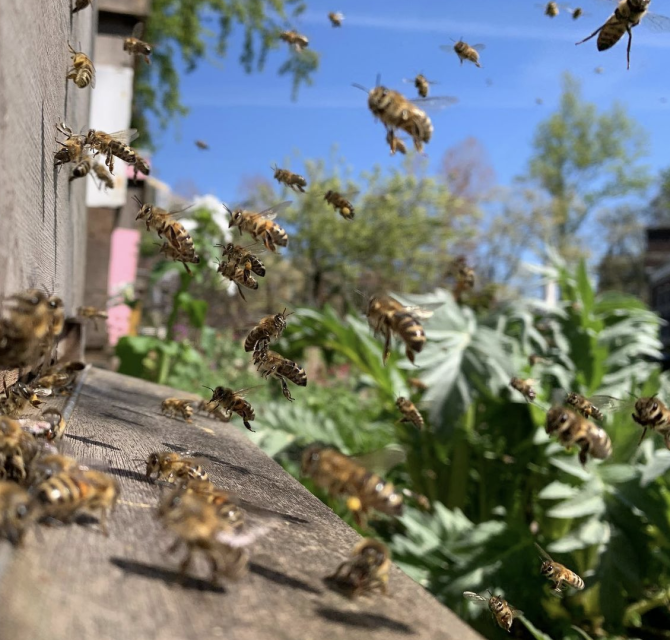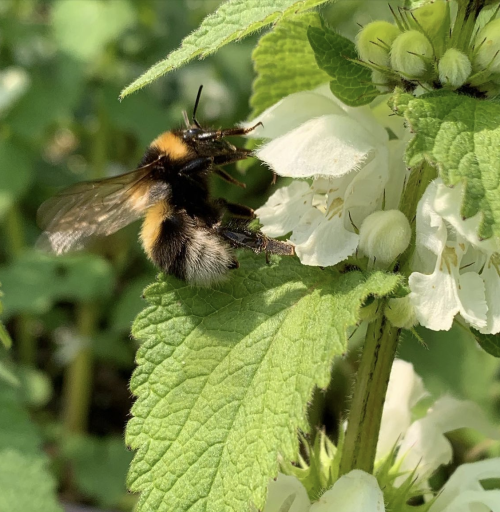
Working together with nature at Haagse Honing and Haags Zaad
9 May 2023
Haagse Honing is a small bee farm located at the ‘gemaalcomplex’ in The Hague. Eveline de Heij, a graphic designer with a keen interest in plants, is creator and founder of Haagse Honing. In 2012 she decided to start a beekeeping course. Here she learned that in the Netherlands there are 356 species of bees and 29 species of bumblebees, at least half of which are threatened! The course inspired Eveline to start with her first beehive in the garden. Planting soon followed, to create a nutritious space for the bees. Her intention is to garden ecologically with the Haagse Honing initiative.
Currently, there are six beehives in the garden. The honey produced by the bees is sold only on site. In this way, people become more aware of what it takes to produce honey. In this way, beekeeping contributes to SDG 12: responsible production and consumption. Eveline explains: "I am completely dependent on the weather; it determines how much honey there is. For example, rain is necessary for nectar, but if it rains too much, the honeybee cannot fly. If it is too cold, the bees eat a lot of the honey themselves. In addition, it also depends on the beehive. For example, a queen may die. Should there be no eggs, no new queen of that colony can emerge, and the hive will perish. So, whether or not I can harvest any honey depends on nature. Usually I can harvest in late May and early August." Honey sales are always announced on the various social media channels (see contact information).
In addition to Haagse Honing, Eveline also uses her garden for another purpose, Haags Zaad (Hague Seed). The name is an ongoing source of amusement. Haags Zaad evolved from Haagse Honing. The garden is full of "bee plants" that provide food for pollinating insects, including bees. Through pollination, the plants produce more seed. This means that few plants are needed to harvest many seeds. There was no use for these seeds at first, until Eveline came up with the idea of selling them. By selling seeds and handing out cuttings or young plants, Haags Zaad encourages the spread of plants that are useful to bees. This contributes to SDG 15: protect and sustainably use ecosystems, forests and biodiversity. When purchasing Haags Zaad, it shows that Eveline is a graphic designer: the cards included with the seeds were all designed by Eveline herself.
Insects aren’t scary
Nature is important. Eveline describes it as follows: "We are nature. Many people find insects scary and think that maintaining them is a lot of work. There is a huge gap between humans and nature. Let's cooperate with nature, instead of working against it. By maintaining plants (occasionally), you will see them grow and flourish. Also, you don't have to go to the gym as much."
Food forest at Pluk!
Pluk! Den Haag is located in the greenery of Madestein recreation area. It is a place where all kinds of things can be experienced. There is a botanical garden, petting zoo, a lunchroom, a ‘picking garden’ and much more. Because there was some land left over, Eveline was able to use it for a food forest. Edible crops are grown here. These are perennial crops. During the flowering stage, this is therefore attractive to insects. These crops are then pollinated, which in turn produces more fruit. Here again, sustainable use is made of ecosystems, forests and biodiversity (SDG 15). These projects are also part of Haags Zaad.

Contact details/ Social channels
More information can be found on the social media channels below. Here is also indicated when the honey will be sold.
https://www.instagram.com/haagsehoning/?hl=en

